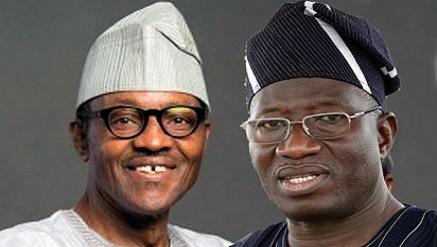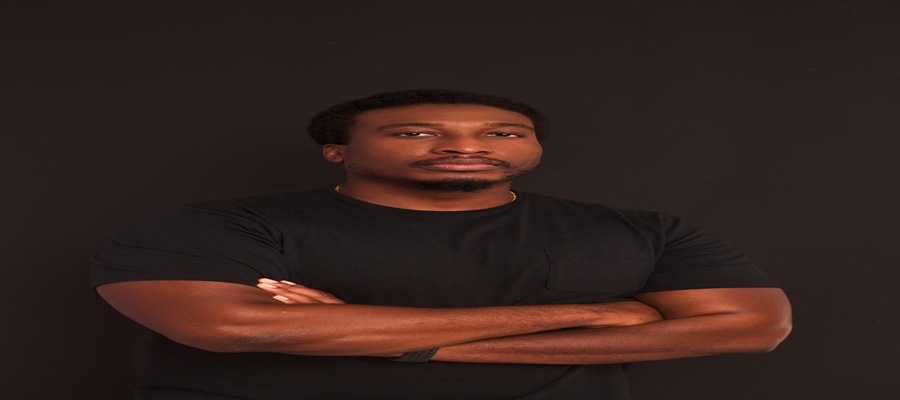General News
GEJ vs GMB: Embarrassment of Choices ahead of Tomorrow’s Election

Nigerian President Goodluck Jonathan and Vice President Namadi Sambo are in a tight contest for Saturday’s election with main opposition candidate Muhammadu Buhari and his running mate, Yemi Osinbajo, according to Reuters.
The vote is widely expected to be the closest presidential poll Africa’s most populous nation and biggest economy has seen since it returned to civilian rule in 1999.
Reuters said that in all, there are 14 presidential candidates but Jonathan and Buhari are well ahead of the rest.
Here are details on the main presidential and vice presidential aspirants of their parties.
PEOPLE’S DEMOCRATIC PARTY (PDP)
Presidential candidate: GOODLUCK JONATHAN
— Goodluck Ebele Jonathan was born in the Niger Delta in November 1957 to a family of canoe makers. He studied zoology and worked as an education inspector, lecturer and environmental protection officer before going into politics in 1998.
— Usually dressed in his trademark fedora hat and traditional caftan-like attire, he has a PhD in zoology.
— Jonathan won election in 1999 as deputy governor of Bayelsa, one of three main states in the oil-producing Niger Delta, as a member of the PDP. He became state governor in 2005, then vice president in 2007 alongside President Umaru Yar’Adua.
— Jonathan was sworn in as president, vowing to fight corruption, on May 6, 2010, a day after Yar’Adua died.
— His 2011 election upset northern elites due to an informal pact within the PDP that power should rotate between the mostly Muslim north and the largely Christian south every two terms.
— Jonathan’s administration has been dogged by several corruption scandals in the oil sector. In early 2013, the president dismissed the then central bank governor Lamido Sanusi after the latter accused the state oil company of failing to remit billions of dollars of oil revenues it owed the state.
— The Christian southerner has been criticized for failing to tackle a six-year Boko Haram insurgency, during which the militant group killed thousands in its attempt to set up an Islamic state in northeast Nigeria, and kidnapped hundreds.
Vice presidential candidate: NAMADI SAMBO
— Mohammed Namadi Sambo was born in August 1954 in northern Kaduna state. Jonathan will hope his Muslim running mate will attract votes in the north where the president is least popular.
— Sambo is a qualified architect. He held positions in the Ministry of Works, Transport and Housing in the 1980s, left to pursue private practice in the 1990s before returning to politics as governor of Kaduna state in 2007.
— His main achievement as governor was on security, a major problem in Kaduna which has suffered from sectarian clashes.
ALL PROGRESSIVES CONGRESS (APC)
Presidential candidate: MUHAMMADU BUHARI
— Buhari, born in December 1942, was military ruler of Nigeria between December 1983 and August 1985. He was also an unsuccessful candidate in the 2003 and 2011 elections.
— A major general, he was selected to lead the country by military officers after an almost bloodless New Year’s eve coup in 1983 ended Nigeria’s second attempt at democracy.
— His iron-fisted administration is remembered for the jailing of politicians for corruption and executing of drug traffickers.
— Buhari himself was overthrown in a 1985 coup.
— His reputation as a disciplinarian, and a popular perception that he is cleaner than many in the political elite, has played well with voters fed up with worsening corruption.
–The bloody Boko Haram insurgency has made security a major campaign issue for Buhari. He points to his achievements as a military ruler against Chadian militia.
Vice presidential candidate: YEMI OSINBAJO
— Osinbajo, a southern lawyer, was announced as Buhari’s running mate in December 2014.
— He is also a Christian pastor, a move aimed at wooing Christians who might be unhappy with a Muslim northern presidential candidate, a pattern in Nigerian elections in which aspirants try to balance the two religions.
— The selection of Osinbajo as a vice presidential candidate is also likely to be an attempt to win over voters in the southwest – where he is from, seen as the major swing block.
General News
Paystack Launches The Stack Group as Pan-African Tech Powerhouse

Paystack, the leading African payments platform solving complex financial challenges for businesses across the continent, has launched The Stack Group (TSG), a new parent holding company that consolidates its expanding family of technology brands.

Paystack
Founding shareholders of TSG include global payments giant Stripe, Paystack Founder and Chief Executive Officer Shola Akinlade, and key employees from the Paystack team, with agreements formalised in October 2025 pending necessary regulatory approvals.
Since Stripe’s strategic acquisition of Paystack in 2020, the company has recorded exponential growth, achieving a 12-fold increase in payment volumes while securing licences and operations in five African markets—Côte d’Ivoire, Ghana, Kenya, Nigeria, and South Africa—alongside regulatory approvals for Egypt and Rwanda, collectively representing approximately 46 percent of Africa’s gross domestic product.
This pan-African expansion, driven by a product-first strategy, has propelled Paystack to profitability at the group level, a key milestone announced alongside the TSG launch.
The formation of TSG follows closely on the heels of Paystack Microfinance Bank’s (MFB) recent debut in Nigeria, operating as a fully independent bank to internalise critical financial infrastructure and deliver banking and credit services tailored for more than 300,000 Nigerian merchants.
These integrated capabilities empower the development of seamless, compliant end-to-end money movement solutions, reinforcing Paystack’s core mission to build innovative technology that fuels African ambition and addresses unique continental business needs.
Under the TSG umbrella, the portfolio encompasses Paystack for merchant payment innovations, Zap for consumer-focused payments, Paystack MFB for banking services, and TSG Labs dedicated to pioneering emerging technologies and developing novel products both within financial technology and beyond.
Each entity maintains operational independence while sharing core values and specialised expertise in crafting solutions for Africa-specific challenges, fostering synergies across complementary domains.
Shola Akinlade, speaking on the landmark development, declared that the launch of TSG heralds an era of broader ambition, setting the strategic direction for the company’s next decade of impact.
“Having partnered with thousands of businesses continent-wide since 2016, the vast opportunities to extend support beyond payments are evident, and TSG positions us to confront the multifaceted hurdles African enterprises encounter,” Akinlade stated.
He extended gratitude to the Stripe team for their unwavering faith in Africa’s technological promise and Paystack’s capacity to pioneer transformative innovations for the continent and global markets.
This corporate restructuring coincides with Paystack’s 10-year anniversary celebrations in January 2026, underscoring a decade of resilience, innovation, and market leadership in Africa’s burgeoning digital economy.
Industry observers view TSG as a bold masterstroke that not only safeguards Paystack’s legacy but also amplifies its potential to shape the future of financial services, commerce, and technology across Africa at a time of rapid digital transformation and heightened investor interest in the region’s fintech ecosystem.
General News
Kuda Unlocks Instant Online Accounts for NGOs and Religious Bodies

Kuda has updated its business banking services to allow NGOs and incorporated trustees to open and manage business accounts entirely online. The move means religious organisations, charities, and other registered organisations no longer have to navigate the long wait and paperwork traditionally associated with setting up a business account.

Nosa Oyegun,
On the Kuda Business app, organisations registered with Nigeria’s Corporate Affairs Commission (CAC) can choose the NGO option during signup, submit their CAC documents, and provide trustee details. Once verified, accounts are activated within minutes, a significant reduction from the days or weeks it can take under traditional business banking processes.
For many NGOs and religious institutions, handling donations, grants, and operational expenses has long been slowed by manual systems and branch-based requirements.
The Kuda Business update is expected to make financial management faster and more transparent, allowing organisations to focus on their mission instead of battling administrative bottlenecks.
Nigeria is home to thousands of registered NGOs and religious organisations, with Lagos State alone accounting for over 10,000 churches and mosques as of the last count in 2021. Across the country, incorporated trustees play a critical role in education, healthcare, humanitarian response and community development. Despite their scale and economic relevance, access to modern digital banking tools has remained limited for many of these institutions.
Nosa Oyegun, SVP Business Banking at Kuda, said the update is proof of Kuda’s focus on removing structural barriers that slow Nigerian organisations down. “NGOs and religious organisations are responsible for managing funds that directly impact communities, yet they are often forced to operate with outdated banking processes,” he said.
“By enabling incorporated trustees to open Kuda Business accounts entirely online quickly, we’re giving these organisations access to the same modern financial tools built by Kuda that other businesses already use, so they spend less time doing admin work.”
With Kuda Business, NGOs and religious organisations can manage incoming donations and grants, make payments, track transactions in real time, generate professional account statements for audits and reporting, and grant controlled access to trustees, treasurers and administrators, all on a single app.
Kuda designed the account signup process to meet regulatory requirements while significantly reducing manual reviews and customer support workload. Automations shorten notoriously long business signup timelines while improving information accuracy and user experience.
As reforms promoting cashless payments and digital financial services take hold in Nigeria, NGOs and religious organisations are under increasing pressure from donors, partners and regulators to operate with greater financial transparency and efficiency.
The new Kuda Business update is therefore timely, offering a dedicated digital account specifically designed for this segment, unlike many traditional banks and fintech platforms that treat incorporated trustees as special cases requiring comparatively slower manual intervention.
General News
Catholic Bishops Urge FG to Give Tax Laws Human Face

Catholic Bishops of the Ibadan Ecclesiastical Province has called on the Federal Government to implement the ongoing tax reforms with equity, openness and empathy, cautioning that policies devoid of human consideration could further compound the suffering of millions of Nigerians.

The appeal was contained in a communiqué released after the bishops’ first provincial meeting for 2026, which took place at the Jubilee Conference Centre in Ibadan, Oyo State.
The document was jointly signed by Most Rev. Gabriel Abegunrin, chairman of the Ibadan Ecclesiastical Province, and Most Rev. John Oyejola, secretary.
Recall that the tax reforms were introduced by the administration of President Bola Tinubu and assented to on June 26, 2025.
They officially came into effect on January 1, 2026, and have continued to attract diverse reactions across the country.
In the communiqué, titled “Sustaining Hope and Strengthening Our Good Efforts,” the bishops acknowledged the government’s desire to overhaul Nigeria’s tax system but expressed concern that its implementation had sparked widespread unease and debate, especially among the poor and vulnerable.
“The reforms should be anchored on fairness, transparency and accountability, urging the government to apply them with compassion.
“The bishops also advised that vulnerable citizens should be given sufficient time to adapt to the new tax regime before strict enforcement measures are introduced.”
The clerics warned that economic policies pursued without sensitivity could widen inequality and heighten social unrest, noting that taxation should not become an added burden for Nigerians already grappling with inflation, unemployment, and rising costs of living.
The bishops encouraged Nigerians to remain hopeful while backing prayers with responsible citizenship, diligence and respect for justice and the rule of law.
“As shepherds of God’s people, we urge Nigerians to reject cynicism and despair. Prayer must be accompanied by good works. This is the only country we have,” the communiqué concluded.

 Telecom3 days ago
Telecom3 days agoSpacecoin Secures Licenses to Roll Out Satellite Connectivity in Nigeria, Kenya

 Telecom3 days ago
Telecom3 days agoGoogle Report: Nigeria Leads Global AI Adoption in Learning, Entrepreneurship

 E-Business3 days ago
E-Business3 days agoWhat the Retail and E-commerce Sector Should Expect in 2026 in Era of AI-driven Shopping and Privacy

 Telecom3 days ago
Telecom3 days agoAVEVA Names Khaled Salah Vice President for Africa to Drive Growth

 E-Financial3 days ago
E-Financial3 days agoFG Shops for N900Bn from Domestic Market with High-Yield Bonds

 E-Financial3 days ago
E-Financial3 days agoCBN Raises Alarm over Loan Defaults by Households, Corporates

 Telecom3 days ago
Telecom3 days agoNetflix Switches Warner Bros. Bid to $27.75 Cash Offer as MultiChoice Secures HBO Future

 General News3 days ago
General News3 days agoTaraba Adopts Electronic Case Management System



























